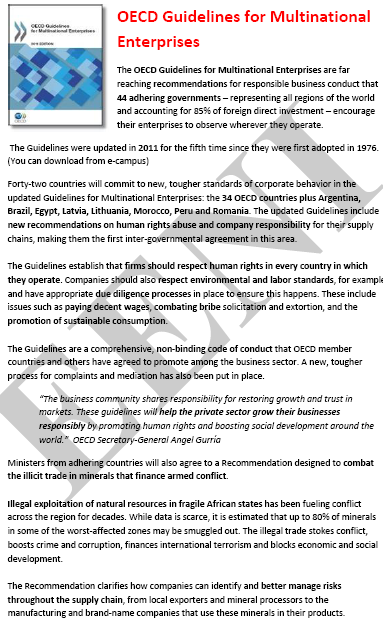OECD Economic Cooperation

Organization for Economic Cooperation and Development (OECD) Environmental and governance challenges
- Introduction to the OECD
- History and Structure of the OECD
- Analyses and studies of the OECD
- OECD Economic Outlook
- Introduction to the OECD anti-corruption measures
The objectives of the subject “Organization for Economic Cooperation and Development (OECD)” are the following:
- To understand the purposes and structure of the Organization for Economic Cooperation and Development
- To know how to use the analyses and studies provided by the OECD
- To understand the role of the OECD in the globalization and international trade
- To learn about the OECD anti-corruption measures


The Subject “Organization for Economic Cooperation and Development (OECD)” belongs to the following Online Programs taught by EENI Global Business School:
Masters: International Business, Foreign Trade.
Area of Knowledge: Globalization.

OECD (Organization for Economic Cooperation and Development).
The OECD helps to the governments to guarantee the responsiveness of the key economic areas (trade in goods and services, foreign direct investment, globalization) monitoring their activities, helping the governments to adopt strategic policies.
The OECD Economic Outlook analyses the major trends in the economy and foreign trade in products and services of the OECD member economies.
The Organization for Economic Cooperation and Development member countries are Australia, Austria, Belgium, Canada, Colombia, Chile, Czech Republic, Denmark, Estonia, Finland, France, Germany, Greece, Hungary, Iceland, Ireland, Italy, Israel, Japan, Latvia, Lithuania, Luxembourg, Mexico, Netherlands, New Zealand, Norway, Poland, Portugal, Slovakia, Slovenia, Spain, South Korea, Sweden, Switzerland, Turkey, UK, and the U.S..
- OECD Accession Candidate: Costa Rica
- OECD Key Partners: Brazil, India, Indonesia, South Africa



 or
or 
